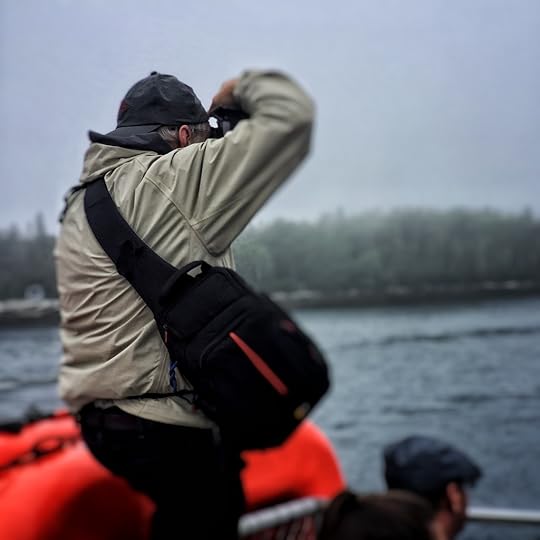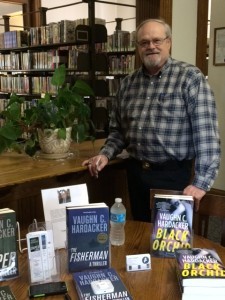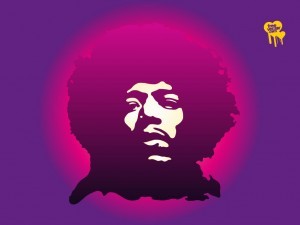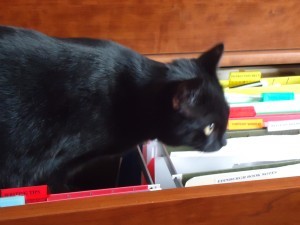Kathy Lynn Emerson's Blog, page 71
June 30, 2016
Meet Maine Literary Award Winner Brendan Rielly
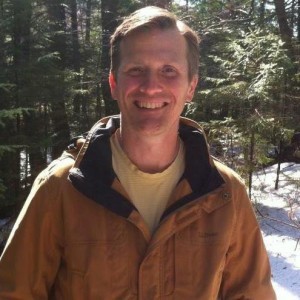 Today we’re pleased to introduce Brendan Rielly, who is the winner of the 2016 Maine Literary Award for Crime Fiction, to discuss his debut work, An Unbeaten Man.
Today we’re pleased to introduce Brendan Rielly, who is the winner of the 2016 Maine Literary Award for Crime Fiction, to discuss his debut work, An Unbeaten Man.
Q. Tell us about The Unbeaten Man.
The Unbeaten Man features a Bowdoin College microbiologist who creates a microbe that can clean up any oil spill no matter the size, which should be a great thing. But bad guys figure out a way to weaponize it, and they force him to deploy it against Russia and Saudi Arabia to destroy their oil reserves and cripple their countries and throw the world in chaos. That’s the big plot. What’s underlying that is that the main character, Michael McKeon, had a very tortured and difficult childhood. He grew up in Westbrook, which is actually my home time, and lost his sister and his parents to drugs and violence. Left on his own, he found his way to the Mission Possible Teen Center, which is a real place in Westbrook, now called My Place Teen Center, where his mentor was a Bowdoin College professor who introduced him to math and science and got him moving on a good path. Now, years later, he’s a professor at Bowdoin. The bad guys force him to do their bidding by kidnapping his wife and adopted daughter. Having lost one family, he can’t even bear the thought of losing another. So in the true genre of thriller heroes, he will do whatever it takes.
Q. What inspired The Unbeaten Man?
This is sort of an esoteric start, but I was actually reading Thomas Friedman’s book, Hot, 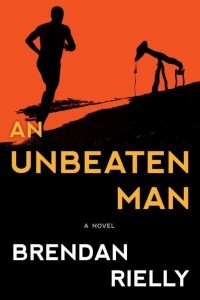 Flat and Crowded. He talks a lot about oil politics and that when oil prices are high, oil nations like Saudi Arabia and Russia rattle the sabre a little more, and when oil prices are low, that shifts the balance of power. He mentions some of the attacks that have been attempted on oil facilities, particularly in Saudi Arabia and particularly at the oil facility that’s featured in my book, which is called Abqaiq, which is one of the most vital pieces of the Saudi oil infrastructure. It is a constant target for attacks, so it has one of the most secure facilities in the world and no attack has ever been successful. That jumped into my brain, and I started to think, what if instead of attacking the facility, somebody could actually attack the oil? What if you could put something in the oil that would destroy it and then would go back out to all of the other oil reserves and all of the other facilities? I started doing a little research and came across some work that had been done in the oil sands up in Canada, where they were working with microbes that could break oil down and release natural gas, destroy the oil but actually get natural gas out of the ground. It wasn’t a big jump from there to say, well, if you could do that, what if you could just destroy it, and that was the plot of the book.
Flat and Crowded. He talks a lot about oil politics and that when oil prices are high, oil nations like Saudi Arabia and Russia rattle the sabre a little more, and when oil prices are low, that shifts the balance of power. He mentions some of the attacks that have been attempted on oil facilities, particularly in Saudi Arabia and particularly at the oil facility that’s featured in my book, which is called Abqaiq, which is one of the most vital pieces of the Saudi oil infrastructure. It is a constant target for attacks, so it has one of the most secure facilities in the world and no attack has ever been successful. That jumped into my brain, and I started to think, what if instead of attacking the facility, somebody could actually attack the oil? What if you could put something in the oil that would destroy it and then would go back out to all of the other oil reserves and all of the other facilities? I started doing a little research and came across some work that had been done in the oil sands up in Canada, where they were working with microbes that could break oil down and release natural gas, destroy the oil but actually get natural gas out of the ground. It wasn’t a big jump from there to say, well, if you could do that, what if you could just destroy it, and that was the plot of the book.
Q. How long did it take to write the book?
About eighteen months to research and write. There was a lot of research involved because
there’s science in the book, and I’m not a scientist. I worked with four different professors to
make sure I got the science right and made any changes that they felt needed to be made.
Q. How has The Unbeaten Man been received?
Fantastic. It’s actually kind of been overwhelming on a couple of levels. One level is with other authors. This has opened me up to this group of authors not just in Maine but literally around the entire world, this group of international thriller writers who have been so welcoming and supportive. You would think there was competition, my book is selling and maybe their book isn’t selling, but there is none of that. They have been incredibly supportive, connected me into other markets, giving me reviews. Just to start off with, there were reviews on the back of the book by Steve Berry and Doug Preston and Gail Lynds. These are three New York Times bestselling authors, people at the top of their profession. They gave me glowing reviews. The International Thriller Writers Organization has featured me a couple of times, so that has been fantastic. The reception from the public has also been a blast. I was out at the Maine Mall Borders and sold out of the book, and other book stores have reported to me that they’ve sold out of it multiple times. The only kind of metric that I’ve seen anywhere so far is at Longfellow Books here in Portland. At the end of 2015, they published their top 100 best sellers, and my book was #47 despite the fact that it had only been out for three weeks. It’s just been so much fun talking about the book and having people enjoy the book. When you create something, you put a lot of yourself out there, and whether it’s a painting or a sculpture or a book, it’s a pretty great feeling when somebody picks up a thing that you created and says that they like it.
Q. Kind of a cliched question, we know, but have you always wanted to be a writer?
I’ve always been interested in writing. I grew up in a very literary family. I’m the middle of three generations of published authors. My father, Ed Rielly, is an English professor at St. Joseph’s College. He has written and published more than twenty book. I grew up surrounded by books, and I always loved them. I started writing as a little kid, stories for myself or for friends, and then I kind of gave it up as I got into high school. I was too focused on other stuff. Then in law school, I got the itch again to start writing and took an advanced fiction writing class at Notre Dame. I was only a couple of years older than the kids in the class, but in those couple of years, I had graduated from college, worked for a year, gotten married, gone to law school and just had a baby. So we were from different worlds. While they were writing these kind of Jack Kerouac/Rage Against the Machine all night long pieces, I was writing short stories about my son’s clown mobile, which led for kind of awkward critiques. I wrote my first novel during law school. It was horrible and I’ve never shared it with anybody. It sits in a box of shame in my house.
From that first novel, I moved into a variety of things, but nothing I ever went public with. I would write children’s stories for my kids when they were little. When my kids got a little older, I wrote the first thing that I really liked and thought about sharing publicly–a young adult fantasy. It was like a science-based version of Harry Potter. I was starting to discover my voice. I liked that a lot, but never had the time to try to find an agent and get it published. Then I started thinking a little more seriously about writing and trying to get something published. I realized that I really should write what I love to read, which are thrillers, so I began working the book which became An Unbeaten Man.
MCW: Most of us have books in the drawer!
Q. Is there a sequel in the works?
The Unbeaten Man is the first in a series. Book two,picks up four months after the first book and principally involves Iran. Another book I have completed is a tongue-and-cheek guide to parenting called How to Raise the Perfect Child or at Least Lie About It. I’ve shared that book with some of the people in the publishing world and other authors, and it’s gotten a great reception but I haven’t really made a full court press to find an agent and get that out there. So these are all things that I have to try to carve out time to do.
Q. How do you think growing up in Maine influenced your storytelling?
The place makes the person and Maine certainly impacts and shapes its residents. Maine provided the setting for An Unbeaten Man and will continue to provide the setting for the Michael McKeon series. Maine also provided the setting for my young adult fantasy novel. Maine brings you out of yourself—whether gazing out over the ocean or wandering in the woods or staring down a ski slope—but also gives you the space to create. When you’re constantly jostled by people surrounding you, you’re a different person and a different writer than when you have the space to interact with your environment and think on your own.
Q. What are the burdens and benefits of having a writing parent?
I never saw any of it as a burden. I always found it very helpful to have someone review my writing and make it better. My parents have always been very helpful readers of my work. They’ve always been very loving and supportive, but I also want people to tell me what needs to be improved. I want to get better and feedback is extremely valuable.
Q. How long were you in the unpublished writer’s corner before you sold your first book?
Ugh. That depends on how you measure it. I wrote my first novel during law school 20+ years ago. It was horrible and I knew at the time it was horrible, but it was an exercise in simply getting from start to finish. I never shopped that book. It remains in a box of shame in my basement. Over the years, as I moved through children’s books to young adult fantasy and to a tongue in cheek guide to parenting, I tried sporadically to jump into the published world but with no luck. Once I wrote An Unbeaten Man, I didn’t have time to market it because I was helping Morgan work on his project that turned into Neighborhood Heroes. Then when Morgan and I were at the Book Expo of America in NYC for Morgan’s book. Down East asked to see my book and offered to publish it. So, anywhere from a couple weeks to 20+ years.
Q. What advice would you give to an aspiring writer? Pretend that you have to pay for the words you use. It makes you value them more and choose them wisely.
MCW: Argh! Do I have to pay for the 100 words I took out of one of my novels?
Q. One of our favorite questions to ask newbies here at Maine Crime Writers is to tell us about a favorite Maine place—one that a lot of people might not know about.
The chapel at Bowdoin College. Everyone knows Bowdoin’s beautiful quad and its art museum, but the chapel has always been a place of peace for me.
Q. And of course, since it is summer in Maine and food is on everyone’s mind–can you share a favorite place to eat and tell us why.
Since it’s summer, I’ll go with ice cream. Catbird Creamery in Westbrook. Fantastically inventive, delicious ice cream. Furious George will challenge your taste buds. I love anything with rhubarb. Or stick with the salted chocolate.
An Unbeaten Man is Brendan Rielly’s first thriller. Brendan is a member of ITW and Maine Writers & Publishers Alliance and studied advanced fiction writing while attending law school. Brendan is chair of Jensen Baird’s litigation department and lives with his wife and three children in Westbrook, Maine, where he is the City Council President. Brendan is the middle of three generations of Maine authors with his father and son (as a high school senior) also published.
June 29, 2016
Windjammer Days
by Barb, in Maine at last
It’s Windjammer Days in Boothbay Harbor. My husband, Bill Carito, has gotten deep into iPhone photography, so we took a Balmy Days harbor tour billed especially for photographers. The day was foggy and damp, but you know you’re with a group of photographers when everyone boards the boat, looks up at the sky, and says, “Perfect day!”
Here are some of Bill’s photographs of the day. If you like what you see and want to see more, you can friend him on Facebook here or follow him on Instagram at billcarito (for black and white) and bill.carito.colorphotos (for color).
Enjoy!
June 27, 2016
Ten Tips for Tuning Up Your Descriptions
Kate Flora: There are so many challenges facing a writer who is trying to craft fiction that sometimes descriptions fall far down the list. By the time an author has developed a cast of characters, created a plot filled with twists and turns, and mastered the art of writing dialogue, descriptions can sometimes be left to old clichés or place-holders that await that moment when the author can revisit the work and give them a fresh, new twist.
But we all want our work to shine. Stand out from the vast fields of competing works.
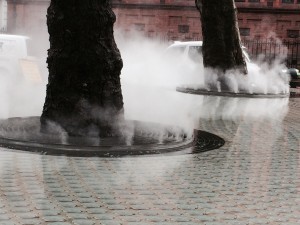
How would you describe this?
Description is meant to be evocative and memorable. We want our books to be the ones that readers will clasp with delight as they say to a friend or significant other: Listen to this . . .
Engage all of your senses. Don’t just describe what can be seen. Describe what can be smelled. Heard. Touched. Perhaps even tasted. Engaging your senses as you try to write description will engage your reader’s sense when they read what you have written. It will locate them more fully and create a greater emotional attachment to your story.

Worn? Shabby? Ancient? Rustic? Draped in wisteria?
Dig deeper and try to find a fresh way of showing. We can talk about worn steps or peeling paint, and a reader will know what we mean. But are there other ways to convey the age of a house, or its long use or lack of repair? The paint rolled away from the weather clapboards like it was recoiling in distaste. The foot-worn centers of the steps were as swayed as a tired old horse. The shutters hung off the house like they were trying to escape. The house looked like it had simply given up. Since writing the dark and desolate can be easier than writing the bright and happy, try the same exercise with a house that’s immaculate or tenderly cared for.
Try writing exercises. Since everything we write must do double or triple duty, it’s great to plug into the wonderful exercise John Gardner offers in the Art of Fiction. It’s one I always use with my students to help them see how they can tell through indirection. The exercise is this: write a paragraph describing a building as seen by a man whose son has died in the war, without mentioning the son, or death, or the war. Then describe the same building from the point of view of someone is love without mentioning love or the lover. See how the description changes as the observing eye changes.
See through you character’s eyes. Figure out what sorts of things your central

Color and tone can set a mood. Reflections in the water can match reflections by a character
character is attuned to, and add those to that character’s inner narration, the way they describe the world themselves. How do they see other people? What characteristics might jump out, and how would they define it? Long ago, as I moved from my Thea Kozak series to my Joe Burgess series, I realized that Thea organizes her world in lists and details, while Joe is more attuned to nature. I need to keep that in mind as I move them through their worlds and play the game with myself of asking: How would Joe Burgess see this? How would Thea Kozak see this? How are they different and what makes them particular to this character?
What does your character carry? In Tim O’Brien’s The Things They Carried, a huge amount of information about the various members of his platoon is conveyed by the things they carry. Choosing certain items, or habits, or mannerisms for a character, either a central character, or someone your central character is observing, can be a very effective shorthand. If you struggle with this idea, you can always start with your purse or your pocket, or the glove box, console, or trunk of your car. What do you carry and what does it say about you? Now, what does your character carry?

Bathed in streaks of late afternoon light through a stained glass window
Color your world. It is perfectly easy to describe something as blue or green or red. But the world is full of wonderful color names, so why not use them? Color names can go in positive, even poetic directions, such as obsidian, cornflower, sapphire or celadon. They can also convey darkness, ugliness, or a sense of the distasteful. Try liver, puce, mole, or mud.
Set your world in motion. Just as the use of color can tune up your writing, so can the use of motion. You can have your character walk into a room, and that’s okay. It gets them there. But if the character bursts into the room, strolls into the room, shimmies into the room, or enters as though being chased by a bear, the scene will be more dynamic. Bring your powers of observation along as you go for a walk, or sit in a mall food court, or go to a farmer’s market or a country fair, and start people watching. People don’t move alike, and as you watch, be thinking about how you would describe what you see. A limp? A strut? A hesitation? Someone strolling through the world like she owns it or teeters along on shoes that are far too high, seeming perpetually on the verge of being launched forward. Sometimes people walk as though the weight of their depression is almost too heavy to carry. Observations like these deepen both the observer and the observed.
Steal from others. Not directly, of course. But it can be very helpful, in determining what appeals to you as a writer, and why, to keep a little notebook in which you write passages which particular appeal to you as you’re reading them. Don’t just copy the passage or mark it in a book. Take the time to write it out by hand. There is something about the act of copying that helps you to feel the rhythm and weigh of the language.
Expand your vocabulary. Get yourself a couple of great books to help you expand your descriptive vocabulary. On my shelf, I have a book called The Describer’s Dictionary by David Grambs, described as “a treasury of terms and literary quotations for readers and writers.” What could be better than pages of quotes and words to describe patterns or edges? Like this one: “Men swore. They pushed at the wheels with long oak poles and slashed at the oxen till their backs were crosshatched with bleeding welts and their noses ran pink foam.” John Gardner, Grendel. Useful to see how other writers have done it.
I also often turn to Rodale’s Synonym Finder. It’s Maine in the summertime, but there are those days when the fog rolls in. How might you describe the sounds on a foggy night? Muffled, muted, dampened, dead-sounding, flat, toneless, indistinct, distorted. I’ve always had fun making lists of words and tacking them to the wall as I am writing the scene.
Keep buying writing books. And read and read the ones that speak to you. Recently, at a library book sale, I found a book by Rebecca McClanahan called Word Painting: A Guide to Writing More Descriptively. It’s a great book to dip into if you’re feeling dull or uncreative.
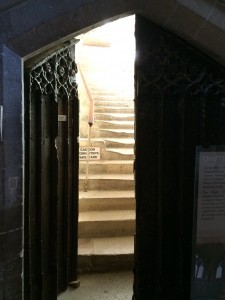
Play with the contrasts of light and dark

Or dark and light. Match a character’s mood or create a contrast
June 26, 2016
“WHO ARE YOU?”
Vaughn Hardacker here: This past week I attended Caribou’s summer event called Thursday on Sweden (I blogged about this last year) a bi-weekly event held on Sweden Street in Caribou. I set up my canopy, attached the banner that proudly proclaimed my name with pictures of my book covers, and arranged the display of my books on the table.

Thursday on Sweden
The live music for that evening was a band called The Ghost of Paul Revere, a popular C&W group, so I expected a large turnout. I attracted a fair amount of attention as my expectations of a large crowd turned out to be true. I made a special effort to actually talk to people (Those of you who know me personally know how out of character that is!) I was actually starting to get in the swing of things when a little old lady (seeing as I’m pushing against 69 you can only guess her age–but suffice it to say she made me feel young) stopped by the table. She studied the three titles and then asked that question that every Mainer or visitor to Maine will eventually hear: “Are you local or from away?” I replied that I grew up in Caribou and graduated from Caribou High School in 1965. She looked at me with a look that I can only describe as that one your old maid grammar school teacher gave you when you messed up–that look that makes you feel stupid–well brain-dead at least. She said in a matter of fact way, “Then you need to tell us that. You need something that tells us who you are.” For a second I felt chastised then I recalled James Stockdale, Ross Perot’s running mate, who opened the vice-presidential debate with the immortal statement “Who am I? Why am I here?”. It struck me that as small a town as Caribou is, I lived away for most of my adult life and to many of the current residents I may as well be from away. She concluded by saying: “You need to do something that tells who you are.” To compound the situation, she smiled, patted me on the back of my hand and walked away without buying a book.
Jane, my partner for life (she says nobody would marry her but a fool and she isn’t marrying a fool), was busting a rib to keep from laughing. I once again felt like a scolded second grader. Jane said, “She sure told you.” I felt my face flush and then answered: “You know what sucks? She’s right. Ninety-eight percent of these people have no idea who I am–and the other two percent are related to me.”
The next morning I got busy and came up with a small poster (shown below):
VAUGHN C. HARDACKER
The author of five crime-thrillers, Vaughn spent his formative years in Caribou, ME and graduated from Caribou High School in 1965. He has degrees from Northern Maine Community College (NMVTI), University of Maine at Presque Isle, and Southern NH University and served in the U. S. Marine Corps and is a Vietnam veteran (1968-1969). He has lived in the Boston area and in Chicago. He has traveled to Asia, Australia, Mexico, South America, England, and Europe. His first two published crime-thrillers, SNIPER (2014) and THE FISHERMAN (2015) were selected as finalists in the Maine Literary Awards Crime Friction Category. Skyhorse Publishing, Inc. has placed his next two thrillers, WENDIGO (July 2017) and MY BROTHER’S KEEPER (publication date To Be Announced) under contract.
He currently resides in Stockholm, ME. He can be followed on twitter at @VCHardacker and his webpage is http://www.vaughnhardacker.com
This will be prominently displayed on my table going forward. That way there will be no question about “Who am I? Why am I here?”
June 24, 2016
Weekend Update: June 25-26, 2016
 Next week at Maine Crime Writers there will be posts by Vaughan Hardacker (Monday), Kate Flora (Tuesday), Dick Cass (Wednesday), Barb Ross (Thursday), and ??? (Friday).
Next week at Maine Crime Writers there will be posts by Vaughan Hardacker (Monday), Kate Flora (Tuesday), Dick Cass (Wednesday), Barb Ross (Thursday), and ??? (Friday).
In the news department, here’s what’s happening with some of us who blog regularly at Maine Crime Writers:
from Kaitlyn Dunnett: I’m interviewed in the June issue of Savvy Scottie Magazine about The Scottie Barked at Midnight. Cool, huh?
An invitation to readers of this blog: Do you have news relating to Maine, Crime, or Writing? We’d love to hear from you. Just comment below to share.
And a reminder: If your library, school, or organization is looking for a speaker, we are often available to talk about the writing process, research, where we get our ideas, and other mysteries of the business. Contact Kate Flora: mailto: kateflora@gmail.com
And Now For Something Completely Different
John Clark sharing a bit of my college experience and a most amazing friend who I met during that time.
I graduated in a class of 38 from Union High School in June of 1966. Since most everyone who was college-bound was going to UMO or UMF, I was determined not to join them because I felt it would be a continuation of high school and I was ready for something completely different. I’d applied to Bowdoin, Princeton and Arizona State, the latter at the suggestion of my junior year English teacher Maxwell Fogleman who had moved to the Phoenix area because his wife had really severe arthritis. Bowdoin and Princeton weren’t thrilled with my math grades, but ASU, on the other hand, gave me a full academic scholarship. End of college search.
Mom was going to school herself at UMO that summer and arranged for me to share driving with a professor who was going to winter in California. We drove through a bunch of states I’d never seen and I remember almost killing us in Arkansas when I overestimated the passing power of his Fiat. I suspect he was more than happy to drop me off in Tempe for freshman orientation.
Going to school in the desert was a shock in many ways. The dry heat caused me to drop 15 pounds in little more than a week, I climbed orange trees on campus after dark to harvest fruit until I was informed that they were ornamental ones and the fruit wasn’t particularly good. Going from a high school of less than 100 to a campus where 29,000 students attended classes took some real getting used to as did hearing people with different color skin speak languages I’d never encountered before. Perhaps the biggest people shock was discovering how many Mormons lived in the area. Keep in mind that I’d gone to a rural Maine high school where the closest thing we had to a minority was the lone Catholic girl im my senior class. Heck, I didn’t even realize there was a significant Franco-American population in Maine until after graduating from college.
At that point in my life, I was still civilized enough to be relatively optimistic and made friends easily. One of my first friendships was with George Castano a fellow in his early twenties who came from Colombia in South America to study architecture. He had a Vespa scooter and we’d often ride through the Valley of the Sun to look at unique architecture. In fact George introduced me to Paolo Soleri’s experimental architectural community Arcosanti (https://arcosanti.org/). I also met a guy from Las Vegas, M. Thomas Carollo who remains a good friend to this day. Our friendship came about because we were the only two in a literature class who knew the Myth of Sisyphus. Other friends included two girls who had come from Laos where their parents were doing community work or were CIA operatives (which of these was true never became clear). Still another friend was a zoology major who wouldn’t go out with a guy until he let one of her two giant scorpions climb from his hand to his shoulder (I passed).
My most interesting friend, however came from Wales because, he said, “I’m tired of absurdly long names and freezing my arse off half the year.” When people first heard Wambu Jerusalem’s name, they expected to see someone with dark skin and an African accent. Fizbin, as I came to call him, was anything but. He was on the short side and chubby with pale blonde hair and scary blue eyes. At first, he planned on going into architecture or pre-medicine, but something happened one night when we left Parry’s Buffet on Mill Avenue to change that.
Fizbin was trying to explain the rules of cricket when there was one hellacious growl as we passed an alley. I froze and looked around expecting Satan to pounce on us. My friend swore in an odd language (I could tell from his tone of voice that what he was saying couldn’t be repeated in his mother’s kitchen) and got between me and whatever was about to attack. When the creature did come at us, I sobered on the spot. It might not have been the big guy from hell, but it looked like they belonged to the same union. The ugly bastard was close to seven feet tall, yellow green and had the classic glowing red eyes depicted in every horror tale you’ve ever read. Before I could react, Fizbin did something with his left hand while chanting in that strange tongue. He caught our adversary by surprise and the next thing I knew, it had been reduced to a greasy cloud of smoke that smelled like a cross between a decaying chicken and a burning tire. I threw up and, as soon as I was done, he grabbed me and we took off.
I was so shook up, I hid out in my dorm room for three days. Fizbin must have known I needed time to un-freak and start wrapping my head around the attack because he waited until I sought him out and asked what in hell was that all about?
It was time to trust that I could keep a secret, he said. He’d come to the U.S. as much to get away from some family difficulty, as he diplomatically put it, as to keep his buns warm in January. He went on to tell me about his family, who were involved in magic and had been for generations. If I hadn’t seen him in action, I would have been skeptical, but having witnessed an NFL-sized demon reduced to less than overcooked bacon in seconds, helped his credulity big time.
I kept his secret for the next three years and learned more about the magical world and its cast of characters than anyone reading the entire Harry Potter series. Fizbin changed his major to criminal justice shortly after the attack, graduating with honors. He returned to Wales and began a career in British law enforcement shortly thereafter when he moved to London.
I didn’t hear much from him for a while and things in my own life were fairly chaotic, so I didn’t think much about it. When things settled down, I reconnected with him and we’ve been in contact on a regular basis ever since. He retired from the Metropolitan Police Force as a deputy commissioner last fall. Early in his career he had been approached by a shadowy section of British intelligence that became aware of his unique skills. After he was assured he wouldn’t be turned into a human guinea pig, Fizbin signed on and became the central figure in what became known as the Bureau of Extraordinary Enforcement Science, or BEES.
Whenever we chatted by phone or online, he’d hint at some of the things he and a couple other gifted people were creating to even the odds against the bad guys. To say that I was curious and more than a bit envious would be a gross understatement. Last month, he came for a visit and we spent three days touring Maine while he talked nearly nonstop about some of his tricks as he calls them. I’ll let Fizbin take it from here.
Hello MCW readers. I’ve been following the blog since its inception and greatly enjoy the creativity and variety of postings. As John has noted, I’ve enjoyed a most unusual career in British law enforcement. To help you understand what I did, think about the concept of open source software. Simply put, it is code created that can be modified and improved by anyone capable of doing so. What we did at BEES is pretty much the same thing. Three of us would get a request from some law enforcement entity in the Commonwealth and we’d see if we could cobble together a mix of magic and technology to meet the need. Perhaps the best part of the job was having free rein to name our creations, like being part of Monty Python, if you will.
Our oldest creation came from a request by the Thames Division. With the river getting increasingly murky, they were having a devil of a time locating bodies. We came up with an ectoplasm based seeking device we called the (Infra)Red Herring. This dandy can function to a depth of 300 feet, run for hours and can be altered to seek out flesh, metal or plastic. It’s become very popular not only in the UK, but in parts of Canada. In fact, we get frequent orders from the Mounties in Kissit, Yukon.
Another very popular one is the Clink, named in honor of the old prison on Clink Street. Imaging a heat-seeking missile made of unbreakable and flexible transparent material. You have a hostage situation or a baddie who is vicious and armed to the teeth. Flick a Clink into the air and before you can say tea and crumpets, the villain finds himself handcuffed, often in embarrassing and uncomfortable ways.
Gumshoes are often used in conjunction with Clinks and another invention we call Pavement Pounders. Gumshoes start as a flying cloud of colored ectoplasm and often resemble a horde of insects. The good guys release one when a suspect is fleeing and wait for the fun to begin. The substance can hit 50 kilometers an hour and as soon as it gets ahead of the baddie, drops to the pavement where it becomes stickier than the strongest glue. I wish you could see what happens when the runner hits it and comes to an immediate and painful halt.
Pavement Pounders are like a surreal combination of your Energizer Bunny and a bloodhound. Imagine a moving mist that can sense DNA, gunpowder residue, blood, hair follicles and thread in quantities too small for the human eye to detect. This one saves an incredible amount of time and even saves lives by scouring dangerous neighborhoods for vital evidence.
My personal favorite is the Perpetraitor. I created it when I was in a Jimi Hendrix listening phase, so when released, it often appears as a purple haze with his image flickering as it moves off to do its job. Once released, it seeks out hidden subjects and when it locates them, settles on their head causing them to speak loudly while confessing to whatever crime(s) they’ve committed. One unexpected benefit is that they often confess to things that are utterly hilarious.
These are just a few of the almost one hundred we have created for use by Commonwealth law enforcement. I hope you find them as intriguing as I do.
June 22, 2016
What “Everyone Knows” About Authors …. But Isn’t True
Yes — this is Lea Wait, and this is a “golden oldie” blog post. I first wrote it several years ago, but over the years many readers (and other writers) have commented on it, and I decided that it was time to revisit the subject, with a few additions this time around.
So …
All authors are rich.
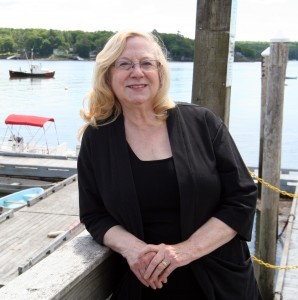
Authors get as many copies of their published books as they want, free, from their publishers. Just ask them — they’ll give you one. If they don’t give you one, they’re not really your friend. (They’d also love to give copies of their books to any charity that asks. The more giveaways the more readers! And all authors want are readers, right?)
Authors get their ideas from a) their dreams; b) the lives of their friends and relatives; c) their characters, who come to them in visions; d) the daily news; and d) complete plots handed to them by strangers. They’d love to hear your ideas for their next book!
Authors have a lot of spare time. All they have to do is write down those stories people tell them. So any author would love to a) watch your children; b) walk your dog; c) serve on your organization’s board; or d) organize a benefit for your worthy cause and call all his or her writer friends to come and support it. (Remember: they’re all rich!)
Authors do very little editing. That unpleasant chore is delegated to their agents and editors. After all, editing squelches the joy of personal expression.
Author’s Assistant & Muse
Authors have staffs to take care of their scheduling and itineraries, book their tours, answer fan letters, design and update their websites, post on social media, write blogs, keep their mailing lists up-to-date, and do research for their next books. (Many also have personal trainers, chefs, and people to clean their houses, wash their clothes, run their errands, and take care of any garden or yard work necessary.) All authors have to do is write, and sometimes read speeches written for them. Their publishers, agents, and personal staff take care of the rest.
An author may get some rejections at first, but after his first book is published anything he or she writes will be published.
Authors always choose the titles of their books, design the covers, decide what format their books will be published in, and set their prices. If you don’t like any of those things, be sure to tell him or her.
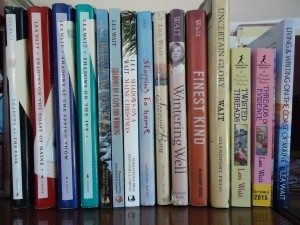
Authors spend a lot of time flying around the country, staying in fancy hotels, being wined and dined, talking with Oprah, and signing their books. The publisher pays for this, of course. If an author is NOT doing this, it’s because he or she has chosen not to.
Not all authors smoke, the way they used to, but most of them still drink pretty heavily. Alcohol fuels their creativity. They also drink because they’re lonely, sitting in front of their computers all the time. Do your author friend a favor by dropping in unexpectedly several times a week to
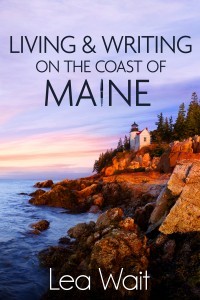
Lea’s book about an author’s life
cheer him up. (And bring wine.)
No matter what they say, authors really are their major characters.
Therefore, of course, romance writers have hot sex lives, picture book writers think like preschoolers, mystery writers want to kill people, and science fiction writers want to blow up the planet. Authors who write about vampires .. well .. you can guess. College professors write literary fiction for other college professors to analyze.
Authors will be really pleased if you tell them you loved their book so much you loaned your copy to twenty of your best friends. They’ll be even more pleased if you tell them that, to save trees and money, you bought it used to begin with.
Now that authors can self-publish, only old-fashioned writers work with agents and traditional publishers. They can make a lot more money putting their book up on Kindle or Nook themselves. If your author friend doesn’t know this, do him a favor by telling him.
Lea Wait writes the Shadows Antique Print series and the Mainely Needlepoint series, as well as historical novels set in nineteenth century Maine. She keeps a bottle of champagne in her refrigerator in case there is something to celebrate, and loves editing sea food of all types (except shark) and listening to the voices in her head. She invites you to friend her on Facebook and Goodreads.
June 21, 2016
Dead Zones, Cell Phones, and the Strange Perceptions of “Folks From Away”
Kaitlyn Dunnett/Kathy Lynn Emerson here. I have a new Liss MacCrimmon mystery coming out at the end of July. In fact, at the end of this post, you’ll see how you can win an advance reading copy even before that. But first, there’s this blog, the result of a pretty good review in Publisher’s Weekly that contained one very strange caveat. Here’s the entire review of Kilt at the Highland Games:
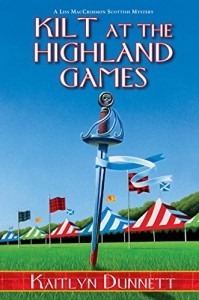 “The Highland Games come to tiny Moosetookalook, Maine, in Dunnett’s enchanting 10th Liss MacCrimmon mystery (after 2015’s The Scottie Barked at Midnight). Despite the influx of trade and tourists, Liss still finds time to do some sleuthing, including finding the dead body of Jason Graye, Moosetookalook’s most despised town selectman and a shady realtor. Suspects abound, and the police are swamped between providing extra coverage for the games, searching for missing persons, investigating Graye’s murder, and looking into a break-in at the post office. Could all these events somehow be connected? Liss enlists the aid of a PI friend to get to the bottom of things, but it’s Liss who ends up facing off with a crazed killer, who’s ready to take out more victims. An implausible lack of cell phone usage undercuts credibility, but otherwise this is an enjoyable cozy from start to finish.”
“The Highland Games come to tiny Moosetookalook, Maine, in Dunnett’s enchanting 10th Liss MacCrimmon mystery (after 2015’s The Scottie Barked at Midnight). Despite the influx of trade and tourists, Liss still finds time to do some sleuthing, including finding the dead body of Jason Graye, Moosetookalook’s most despised town selectman and a shady realtor. Suspects abound, and the police are swamped between providing extra coverage for the games, searching for missing persons, investigating Graye’s murder, and looking into a break-in at the post office. Could all these events somehow be connected? Liss enlists the aid of a PI friend to get to the bottom of things, but it’s Liss who ends up facing off with a crazed killer, who’s ready to take out more victims. An implausible lack of cell phone usage undercuts credibility, but otherwise this is an enjoyable cozy from start to finish.”
The funny thing is, there are probably more references to using cell phones in this entry in the series than in most of the previous ones. Liss and Dan use a cell phone to call the chief of police’s cell phone to report the murder. Later, when Liss is rushing toward a dangerous situation, she uses her cell to contact both the police and Jake Murch, her friend the private investigator. You’d better believe she wants backup! There are also references to cell phones in use by a couple of teenagers, one of whom has a “stupid phone” rather than a smart phone because he’s saving every penny he earns for college. And the “missing person” referred to also uses a cell phone of the throwaway type, to avoid being found. I’m really not sure how much more cell phone usage there could have been, especially in rural Maine.

my personal “dead zone”
Why is rural Maine less likely to rely on cell phones than other places? Ever hear of a “dead zone” where you just can’t get a signal? We’re in one here at my house. No way are we ever going to be able to give up our land line. Cell service is iffy in many areas of Maine, some of them much closer to cities than we are.
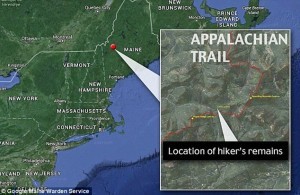 I spent a few days earlier this month on Bailey Island, where I was warned not to rely on being able to get a signal. Hikers at this end of the Appalachian Trail receive a similar warning, and ignore it at their peril. Those who make the mistake of thinking they can call for help on a cell phone if they are injured or lost while out in the wilderness are in for a rude awakening. Hikers, climbers, and even skiers have learned this the hard way. A few end up losing their lives as a result of this miscalculation.
I spent a few days earlier this month on Bailey Island, where I was warned not to rely on being able to get a signal. Hikers at this end of the Appalachian Trail receive a similar warning, and ignore it at their peril. Those who make the mistake of thinking they can call for help on a cell phone if they are injured or lost while out in the wilderness are in for a rude awakening. Hikers, climbers, and even skiers have learned this the hard way. A few end up losing their lives as a result of this miscalculation.
 I do have a cell phone. Like one of those in the novel, it’s a “stupid phone” that has no bells and whistles. I keep it charged and carry it in my purse for emergencies. It costs me under $15 a month. It’s so old that it flips open and has an antenna. It would be no use at all if I needed help in a “dead zone” but when I got a flat tire on the Maine Turnpike on my way home from New England Crime Bake one year, I used it to call AAA and my husband.
I do have a cell phone. Like one of those in the novel, it’s a “stupid phone” that has no bells and whistles. I keep it charged and carry it in my purse for emergencies. It costs me under $15 a month. It’s so old that it flips open and has an antenna. It would be no use at all if I needed help in a “dead zone” but when I got a flat tire on the Maine Turnpike on my way home from New England Crime Bake one year, I used it to call AAA and my husband.
As usual, I’m old fashioned and behind the times. Lots of Mainers do have cell phones and use them for all the things folks from away do—texting, checking social media, looking things up at IMDb. Sometimes they even use them to make or take phone calls. I see shoppers in the local Hannaford with phones to their ears, no doubt checking to see if there’s anything else they need to pick up for supper. I see a good many damn fools using cell phones while driving. But they are not everywhere, and not everybody owns one, or even wants one.
JOIN THE DISCUSSION—WIN AN ARC!
I’ve been rambling on the subject of cell phones for some 800 words now, and I don’t know if I’ve said anything particularly significant, but I’d love to hear what those of you reading this think of the whole issue of cell phones and, in particular, whether you would find a mystery novel less believable simply because there isn’t a lot of cell phone usage mentioned in it.
Leave your comment on this subject below and you will automatically be entered in a drawing to receive an advance reading copy of Kilt at the Highland Games. I’ll wait till the end of the month to draw a name, so if you’re reading this up to eight days after it’s posted, you still have a chance to win.
Kathy Lynn Emerson/Kaitlyn Dunnett is the author of over fifty books written under several names. She won the Agatha Award for best mystery nonfiction of 2008 for How to Write Killer Historical Mysteries and was an Agatha Award finalist in 2015 in the best mystery short story category for “The Blessing Witch.” Currently she writes the contemporary Liss MacCrimmon Mysteries (Kilt at the Highland Games ~ July 2016) as Kaitlyn and the historical Mistress Jaffrey Mysteries (Murder in the Merchant’s Hall) as Kathy. The latter series is a spin-off from her earlier “Face Down” series and is set in Elizabethan England. Her websites are www.KaitlynDunnett.com and www.KathyLynnEmerson.com
Giveaway- Whispers Beyond the Veil
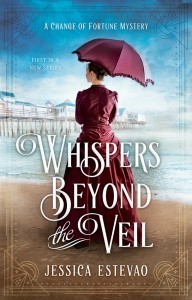 Jessie: Delighted to be breathing the salty air on the coast of Maine.
Jessie: Delighted to be breathing the salty air on the coast of Maine.
Several years ago my family started spending summers in Old Orchard Beach, Maine. Almost immediately, I thought of an idea for The Change of Fortune mysteries series set there in 1898, the year the original pier opened. One thing led to another and before long the book sold.
I just loved working on this book and writing about life in such a magical place at such an exciting time. I also adore the cover pictured at left. Here’s the publisher’s description of the story:
First in a dazzling new historical mystery series featuring Ruby Proulx, a psychic with a questionable past who suddenly finds her future most uncertain…
Canada, 1898. The only life Ruby Proulx has ever known is that of a nomad, traveling across the country with her snake-oil salesman father. She dreams of taking root somewhere, someday, but, until she can, she makes her way by reading tarot cards. Yet she never imagined her own life would take such a turn…
After one of her father’s medical “miracles” goes deadly wrong, Ruby evades authorities by hiding in the seaside resort town of Old Orchard, Maine, where her estranged aunt, Honoria, owns the Hotel Belden, a unique residence that caters to Spiritualists—a place where Ruby should be safe as long as she can keep her dark secret hidden.
But Ruby’s plan begins to crumble after a psychic investigator checks into the hotel and senses Ruby is hiding more than she’s letting on. Now Ruby must do what she can to escape both his attention and Aunt Honoria’s insistence that she has a true gift, before she loses her precious new home and family forever…
The book won’t be available until September 6, 2016 but I have just received a box of advance reading copies and would love to celebrate their arrival by giving away one of them to a commenter. So, share a memory in the comments below about Old Orchard Beach, a visit to Maine or something you love about history and you’ll be entered into the drawing for a copy. Good luck!
June 20, 2016
A Write of Passage
On a mild clear day in April I mowed my lawn for the first time this season. As I suspect it is for others, this is always a day I look forward to. An annual marker as profound as New Year’s Day, a birthday, or an anniversary. A major event signaling that winter has finally passed, mercifully releasing us from her frigid grasp.
Now don’t get me wrong, mowing is a bit of a chore, especially with the three acres of grass I have to mow, and by season’s end I’ll be over it. But at this early moment in the spring, following another daylight-shortened, snowy Maine winter, I relish the task and the chance to circle the lawn while my mind wanders freely and the sun warms my face.
For me, mowing the lawn is always a bit of a trip down memory lane to seasons past. Returning are sights and smells, nearly forgotten, once buried beneath January’s blanket. I spy a red breasted robin bobbing along, monitoring my progress and stopping occasionally to unearth a tasty treat. Swallows and finches dart back and forth between the trees like excited shoppers scouting new locations for homes. And a wary band of turkeys watch my progress with interest from a nearby field, their necks swiveling like periscopes above the undergrowth.
Budding birches, maples, and oaks portend the coming of summer’s green. While carried upon a cool nearly imperceptible breeze are the scents of freshly cut grass, lake water, and the earthy decomposition of last year’s fallen leaves.
Years of country living have taught me to abandoned my fruitless attempts at preventing nature’s botanical interlopers from inhabiting my lawn. Inevitably, the coming months will signal the arrival of all manner of color and aromas. Wild strawberries will come creeping, filling the air with their sweet smell. My lawn will be spotted white with clumps of flowering clover, the lavender of violets, the orange and yellows of the Indian Paintbrush, and a bounty of dandelions. And as the infamous yellow blossoms turn, becoming no more than seed balls on a stem, I’ll mow through them amidst a blizzard of white fluff.
I’m constantly on the hunt for the occasional rogue thistle, too. A weed infamous for wreaking havoc on bare feet, in spite of those glorious purple blossoms. Ever vigilant, I’ll do battle, refusing to allow this spiny guy safe passage.
But there’s so much more to this seemingly mindless chore than simply manicuring blades of grass. There’s a symbolism to the act. This first mowing signals the coming of cookouts, family gatherings, and bocce. Leisurely afternoons spent lounging outside with a tall frosty, as clouds pass overhead and Joe Castiglione transports me down to Fenway Park. Evenings on the deck as brilliant crimson sunsets transform into night and fireflies appear above the field, flickering like wandering stars.
As I turn a corner, overlapping my previous row, it occurs to me how very similar tending the lawn is to the act of writing a novel. Editing the first draft is akin to cutting the grass. There may be thin spots in need of watering or a sprinkle of seed to thicken, or a few thistles to remove. Alternating shades of green reflect the directional pass of the blades like the continuous thread of a well told tale. Wild and unkempt at the start, becoming an unbroken expanse of something special once finished. Which reminds me, I’ve got another book to write.
Happy mowing!





